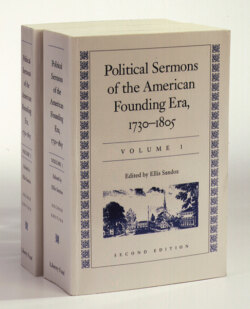Читать книгу Political Sermons of the American Founding Era: 1730–1805 - Группа авторов - Страница 45
На сайте Литреса книга снята с продажи.
ОглавлениеJOHN JOACHIM ZUBLY (1724–1781). Born and educated in St. Gall, Switzerland, Zubly was ordained at the German Church in London in 1744 and went to South Carolina the same year to join his father. After preaching in various churches in South Carolina and Georgia, he became pastor in 1760 of the Independent Presbyterian Church in Savannah. Fluent in six languages, Zubly was widely read; John Adams called him a “learned man.” The College of New Jersey gave him an honorary A.M. in 1770 and a D.D. four years later. He took an early lead in representing the dissenting denominations against the threat of Anglican tyranny. During the Stamp Act crisis he was a powerful voice for American rights. A delegate to the Georgia Provincial Congress in 1775, he was soon thereafter elected one of the colony’s five representatives to the Continental Congress, where he took a prominent role. Although, by fall of that year, it had become clear that independence was in the air, Zubly did not favor that course. After being denounced by Samuel Chase (perhaps for asserting in Congress that republics are “little better than government of devils”), Zubly abruptly departed Philadelphia on November 10, 1775. In 1777 he was banished from Georgia as a Tory, and half his property was confiscated. He found shelter for a time with friends in South Carolina. When royal government was reestablished in Georgia, he was able to return and partially resume his pastoral duties in Savannah.
The leading spokesman for Georgia in the dispute with Great Britain, Zubly is regarded as an impressive literary figure of the time. His An Humble Enquiry, published pseudonymously (1769), presents a powerful constitutional argument against the 1766 Declaratory Act in response to Parliament’s Townshend Acts.
